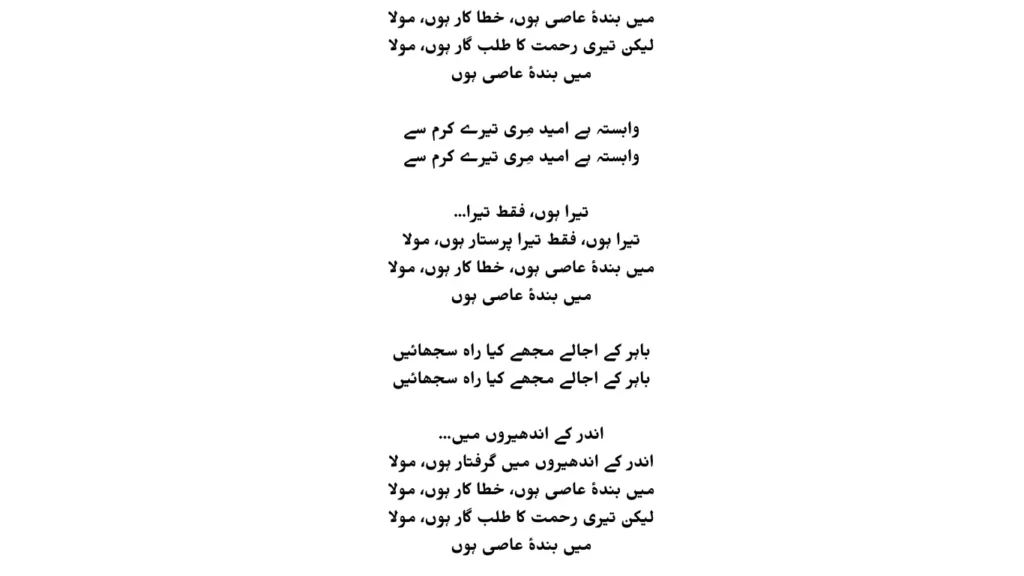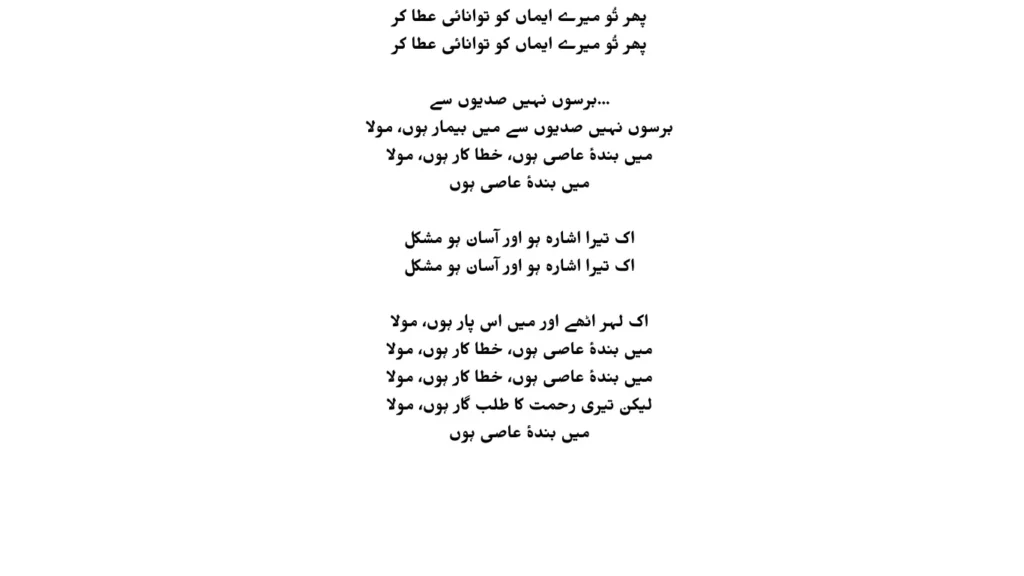Repentance, humility, and seeking forgiveness are central themes in many spiritual traditions. The phrase “Main Banda-e-Aasi Hoon” translates to I am a sinful servant and reflects the heartfelt confession of an individual seeking Allah’s mercy. This article delves deeply into the meaning and context of each verse, exploring themes of human fallibility, divine mercy, and the spiritual transformation that comes from repentance.
This comprehensive guide is designed to provide insights, inspire reflection, and help readers connect deeply with the essence of these sentiments.
| 12 Rabi ul Awal Naat | Eid Milad un Nabi |
| Mujhe Dar Pe Phir Bulana Lyrics in Urdu |
| ilahi Teri Chokhat Per Lyrics by Junaid Jamshed |
| Huzoor Aisa Koi Intezam Ho Jaye Lyrics |
Verse 1: Main Gunahgaar Banda Hoon (I Am a Sinful Servant)
The opening verse, “Main gunahgaar banda hoon,” sets a tone of vulnerability and self-awareness. Acknowledging one’s sins is the first step towards seeking forgiveness. This phrase reflects the humility of a believer who recognizes their shortcomings in fulfilling Allah’s commandments.
Key Reflection
Acknowledging sins doesn’t diminish a person but elevates them in Allah’s eyes if paired with genuine repentance. The Quran states:
“Indeed, Allah loves those who repent and purify themselves” (Surah Al-Baqarah 2:222).
Verse 2: Main Khuda Ka Bad Naseeb Banda Hoon (I Am an Unfortunate Servant of God)
This verse shifts the focus to the emotional state of the supplicant, highlighting feelings of unworthiness. The term “bad naseeb” (unfortunate) conveys a deep yearning for Allah’s grace, despite personal failings.
Key Reflection
Feelings of despair are natural, but they should never lead to hopelessness. Allah’s mercy encompasses all, as emphasized in the Quran:
“Do not despair of Allah’s mercy. Indeed, Allah forgives all sins” (Surah Az-Zumar 39:53).
Verse 3: Main Allah Ka Nafarman Banda Hoon (I Am a Disobedient Servant of Allah)
Disobedience to Allah is a reality of human imperfection. This verse captures the essence of regret and the desire to return to the path of righteousness.
Key Reflection
Repentance transforms disobedience into an opportunity for spiritual growth. As the Prophet Muhammad (PBUH) said:
“All the sons of Adam are sinners, but the best of sinners are those who repent.”
Verse 4: Main Khuda Ke Dar Pe Sir Jhuka Leta Hoon (I Bow My Head at the Door of God)
Submission to Allah is an act of complete surrender. This verse signifies the act of humbling oneself before Allah, acknowledging His supreme authority.
Key Reflection
Bowing to Allah’s will is the ultimate expression of faith and trust. It signifies leaving worldly concerns behind and seeking His mercy wholeheartedly.
Verse 5: Main Tere Karam Ka Mohtaaj Hoon (I Am in Need of Your Mercy)
This line emphasizes the believer’s dependence on Allah’s boundless mercy. The term “mohtaaj” (needy) reflects an inherent reliance on divine blessings.
Key Reflection
No matter how grave one’s sins, Allah’s mercy is always greater. The Quran assures:
“My mercy encompasses all things” (Surah Al-A’raf 7:156).
Verse 6: Main Tere Dar Pe Aaya Hoon, Mujhe Maaf Kar De (I Have Come to Your Door, Forgive Me)
The concluding verse is a heartfelt plea for forgiveness. It captures the essence of repentance: turning to Allah with sincerity and hope.
Key Reflection
Approaching Allah with a repentant heart guarantees forgiveness. As the Hadith Qudsi says:
“O son of Adam, as long as you call upon Me and ask of Me, I shall forgive you for what you have done.”


The Theme of Repentance in Islam
Repentance, or tauba, is a recurring theme in Islamic teachings. It serves as a bridge between human imperfection and divine perfection. The phrases and verses analyzed above highlight the journey from sinfulness to spiritual renewal, emphasizing Allah’s boundless mercy.
FAQs:
The phrase translates to “I am a sinful servant” and signifies humility, repentance, and the acknowledgment of one’s mistakes before Allah.
Islam emphasizes the importance of repentance. It is seen as a means of purification and a way to strengthen one’s relationship with Allah. Sincere repentance erases sins.
Seeking Allah’s mercy acknowledges His supreme authority and compassion. It reflects a believer’s trust in Allah’s ability to forgive and guide.




